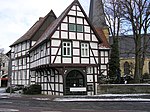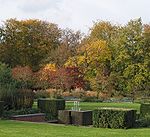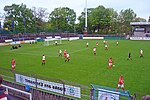Volksbank Bielefeld-Gütersloh

The Volksbank Bielefeld-Gütersloh eG is a regional cooperative bank based in the East Westphalian district town of Gütersloh. With a balance sheet total of € 4.44 billion, it is the third-largest Volksbank in North Rhine-Westphalia and, with 108,600 members, the largest association of individuals in the Ostwestfalen-Lippe region (as of 2018). The bank emerged from the merger of the Volksbank Gütersloh with the smaller Bielefelder Volksbank on May 22, 2014.The Volksbank Bielefeld-Gütersloh's branches and self-service terminals are located in Bielefeld, Gütersloh, Rheda-Wiedenbrück, Verl (excluding Kaunitz), Steinhagen, Herzebrock, Schloß Holte-Stukenbrock, Rietberg-Bokel, Langenberg-Benteler and Versmold-Peckeloh. Two self-service terminals are located in corporate buildings of Bertelsmann.
Excerpt from the Wikipedia article Volksbank Bielefeld-Gütersloh (License: CC BY-SA 3.0, Authors, Images).Volksbank Bielefeld-Gütersloh
Friedrich-Ebert-Straße, Gütersloh
Geographical coordinates (GPS) Address Website External links Nearby Places Show on map
Geographical coordinates (GPS)
| Latitude | Longitude |
|---|---|
| N 51.909135 ° | E 8.384591 ° |
Address
Volksbank
Friedrich-Ebert-Straße 73
33330 Gütersloh
North Rhine-Westphalia, Germany
Open on Google Maps






